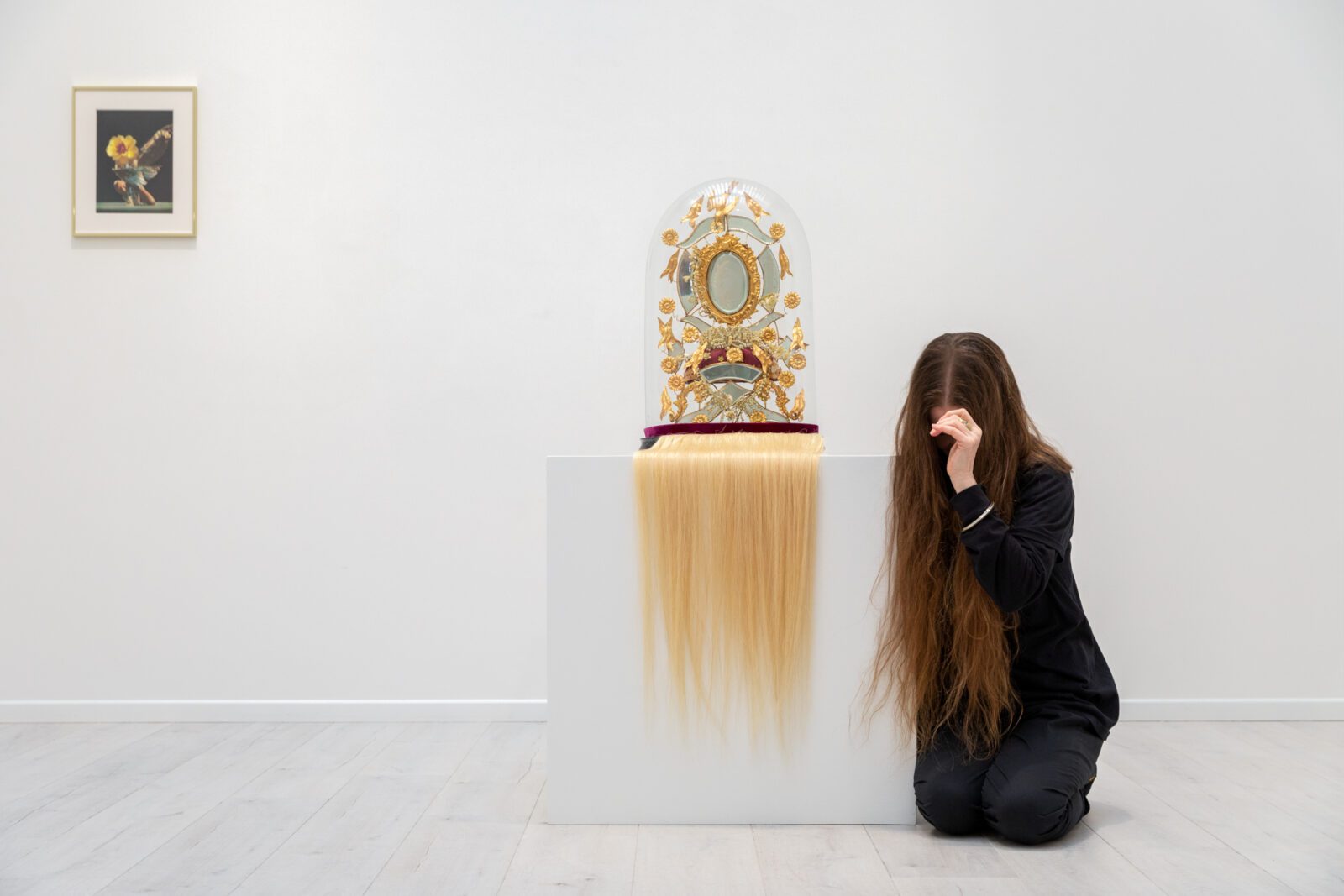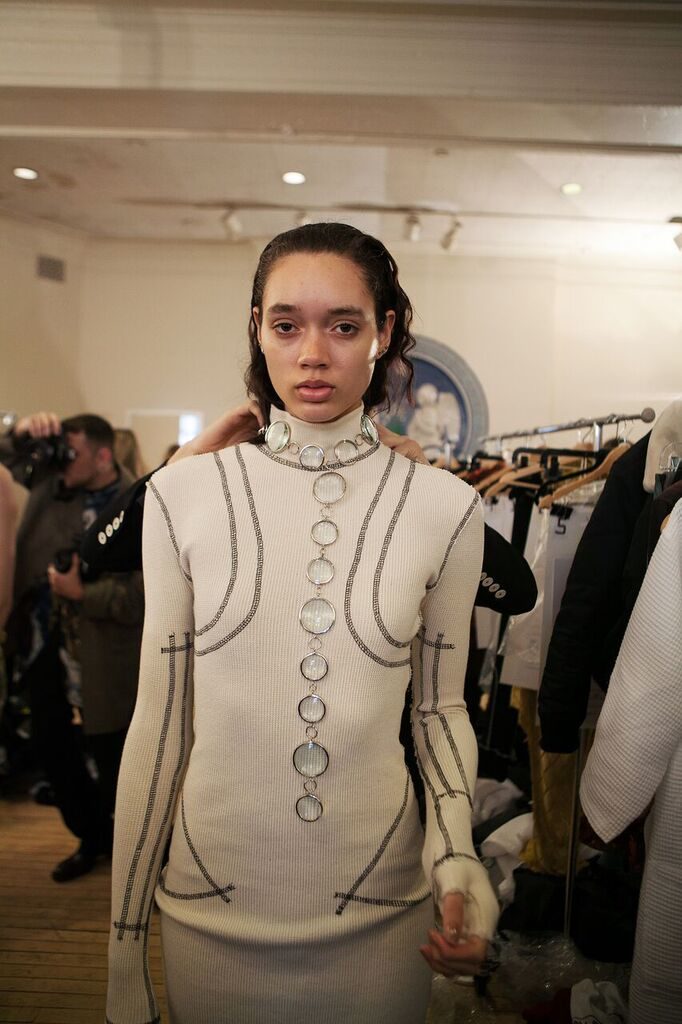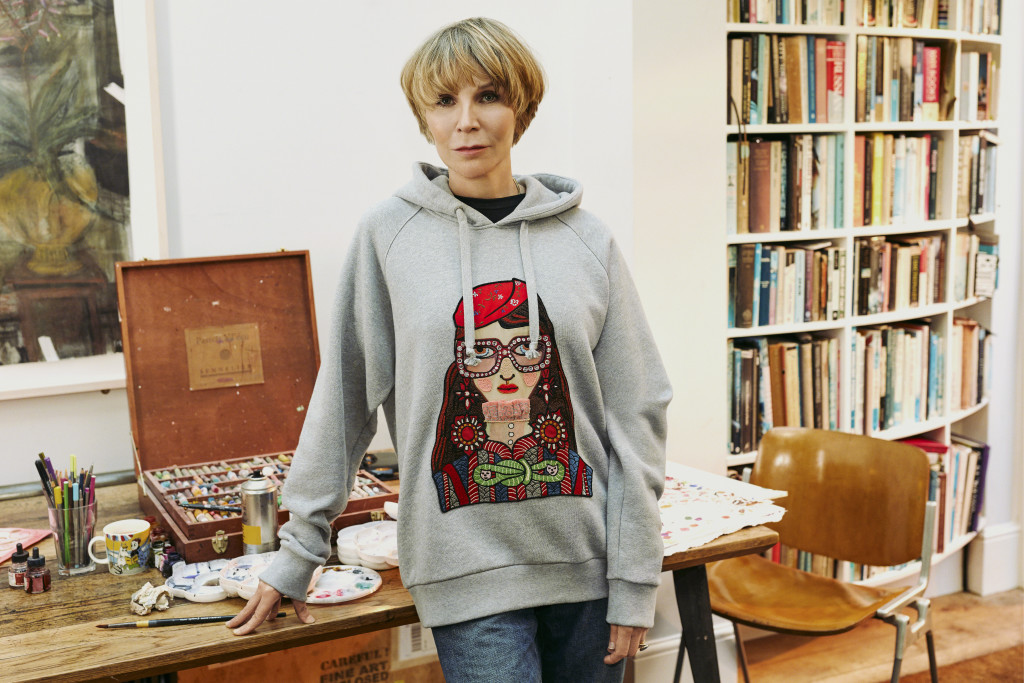
MIA KHALIFA, INTERVIEW BY LINDER
By Linder Sterling
On the occasion of the Linder retrospective at the Hayward Gallery ‘Danger Came Smiling’ (until 5 May), the photomontages of Mia Khalifa for CRASH 100 « TIME CAPSULE » are now exhibited. Untitled ‘Did he prefer her to us ?’ This portraits of Mia Khalifa were taken in the Church of Mary Magdalene, London.
Mia Khalifa was born in Beirut in 1993 and later moved to the United States where she continues to live and work today. Her short career in the adult entertainment industry could be credited for her rapid rise to fame and viral status, but in 2016 she officially decided to retire from the porn industry and focus instead on other aspects of her life. Her interpersonal journey led her to become one of the most acclaimed figures on social media both for her past, which many have described as controversial, and also for her personality and her deconstruction and indictment of the sex industry, which has led her to lecture on the subject around the world, cautioning those susceptible to falling prey to an often deceptive and flourishing industry.
Linder Sterling, born in Liverpool and known commonly as Linder, is a British artist best known for her photographs, photomontages and performances that focus on femininity, feminism and its various conflicts and contrasts. We met Linder for an interview (available on crash.fr) on the occasion of her exhibition The Groom at Andréhn-Schiptjenko Gallery in Paris. During the conversation, Linder expressed that she would love to do a project with Mia Khalifa and thus this project was born in which Linder photographed Mia in the Church of Mary Magdalene in London, dressed exclusively in Acne Studios…
LINDER STERLING When we were trying to find the right location for the photo shoot, we wanted a safe space, one of sanctuary even. It felt like a good omen that the only location available in the whole of London that day was the Church of Mary Magdalene: she who has the perfume of holy darkness around her, to quote the writer and diviner Selah Saterstrom. You were raised as a Catholic in Lebanon, you mentioned that your grandmother always had lots of rosaries around when you were growing up. As a child, did you have a sense of heaven and hell, good and bad, sin and virtue?
MIA KHALIFA Oh my God, the Catholic guilt is instilled in you from birth! It is crippling! You cannot breathe with- out someone saying that you should be thankful for your breath because there are people who don’t have breath, and if you are not thankful for every breath you take, then you are doing a disservice to God! I think that I still carry anxiety like that from my Catholic upbringing. There is definitely a sense of shame, heaven, hell, good, evil: all of these things that for some reason Catholics need to have in a very black- and-white form. There is no room for nuance and it is very frustrating to me.
LS Regardless of which faith one follows, do you think that it’s hard to erase the dichotomous thinking of good and bad learned in our formative years?
MK Yes, but that has me thinking much more broadly, notably about the research into the ages where you absorb things like a sponge and then carry them for the rest of your life, either sub- consciously or overtly. It’s especially important to be aware around children between the ages of two to seven because what you instil in them during those early years that affects them even more than what they learn in their teen- age years. Even if they grow out of childhood indoctrination and go on to form their own opinions and make their own decisions, I think that inherently there is still that underlying feeling of doing something bad or constantly feeling like you are in trouble.
LS A lot of the moral absorption from adults around us happens on a somatic level, sometimes it’s only during therapeutic analysis in later life that we realise how burdened we are with formative experiences from childhood. Today, when we examine some of the language used in the narratives surrounding Mary Magdalene, we see it as a form of slut-shaming, everything attempt was made was to de-rank her within the church. Many women have been slut-shamed, including you for the characters that you’ve played in front of the camera. You were acting, often under duress but some people find it hard to separate you from the characters that you played. Thinking about pornography in its original sense of “the writing of prostitutes”, do you think that the language, narratives and consumption of pornography can ever be ethical?
MK I don’t, even though I don’t think that’s a very popular answer to give, especially in the sex work sphere. I think there are a lot of women in that field who do not see me as a positive force or spokesperson for it. That’s why I try not to be a spokesperson for it, since my experience has been an outlier compared to theirs. I’m not speaking from the same experience as they are, so I think my position comes off as a lot more privileged. I am in complete agreement though in that I do not think there is an ethical way to consume porn. If we take Only Fans, for example, you’re creating your page, you’re the one doing whatever you want on it, but at the end of the day it’s putting money in the pocket of a con- glomerate owned by a company that also own the tube sites that are promoting underage sex, housing rape videos, and contributing to the sex trafficking industry. All of these things that are so evil. Even Only Fans is feeds into this, so at the end of the day I don’t think there is an ethical way to consume porn.
LS Pornography is all to do with profit.
MK Yes, it’s the oldest profession in history, so of course the industry surrounding it has found a way to dig its claws into it and not let go. I don’t see that changing ever, but there are ways to make it safer for women. I think it starts with legislation. The contracts are what need to change first and foremost, and then we can worry about other things. All these young girls who are getting trapped in these contracts, putting aside for a moment the crime of sex trafficking, even the legal production of porn is extremely unethical, so I think the contract verbiage and law needs to change.
LS As we know, there are people agitating for change around the world but it’s a slow process because the opposition is so powerful and it’s so difficult to track the perpetrators down. Racism often runs hand in hand with misogyny, did you get a double whammy when the haters began?
MK Absolutely, and I think it’s still there. Just a few days ago, I got into a little back-and-forth with a woman on Twitter after I announced the launch of my brand. Her entire conversation towards me was that I haven’t apologized for sexualizing the hijab. This is a very common thing that I get, to the point that it’s yelled at me on the streets. Leaving a fashion show last season, a girl yelled at me that I need to apologize to Muslim women. I was shocked, because I have given people the government names of everyone who was involved in writing that script. I don’t understand why people are so hellbent on going after me. I was twenty years old when I made those films and I even tried to say no. I told the creators it was a bad idea and that they were going to get me killed for what they were asking me to do. There is only so much you can do at that age though. You’re scared to say no and afraid of what is going to happen to you if you say yes. Of course, I knew no one would force me to do anything, but that’s not how anxiety works and it’s not how you rationalize things when you are young and on put on the spot in the room. It’s not like you get the script in advance. You get your make-up done, put your clothes on and then they tell you what’s going to happen. At that point, you feel like you can’t say no. It’s frustrating to see how much race plays into it, but I think it all comes back to religious extremism, which I guess is the main theme of our conversation today.
LS Retuning to Mary Magdalene, I found a quote by Bernadino de Siena, in wich he lists her many sins. He said Mary Magdalene’s third sin was “through her hair…she did all that she could to make herself more blonde”. I was intrigued to see how you would look wearing a blonde wig. There is so much mythology around blondeness and purity, at the same time blonde hair also seems to signal sexual availabilty. How did it feel to be blonde for an hour?
MK Honestly, it felt amazing! The wig was toned to a beautiful shade of blonde, there was no brassiness to it. I don’t think there was a single crime committed with that wig, it was so much fun to be blonde! I’m obsessed with those photos. I’ve never seen or imagined myself like that and I can now say that blondes really do have more fun. I want to be blonde again. I want to have a wig made up like that just to put on whenever I want. I’ve never dressed up and felt like I was different person before. I think it may be an alter ego that I will have to bring back. It was empowering!
LS There are many relics of Mary Magdalene, not only strands of her blonde her hair but also her tears. You wore beautiful fake tears in her church as an homage. The Victorians especially loved tear catchers, known as lacrymatories from the Greek origin of the word. Victorians were constantly catching their tears! So what makes you cry?
MK Everything! I cry over anything that moves me: anything that makes me happy, sad, excited… I feel like it’s such a freeing thing. I don’t think there is anything wrong with crying. But I’m also always very surprised and happy when I cry, because I feel like it’s a barometer for something good. If I’m moved to that point, it’s always a green flag for me. I can tell the difference between crying from sadness, release or heartbreak versus crying from unadulterated emotion, and I love that. It’s a great guiding light for me.
LS We’re all expected now to have some sort of label by which people can identify us. At the moment, you identify as a designer, a spokeswoman and also an influencer. I wanted to investigate the origins of “influencer” and I see that the word “influence” emerges from astrology in the 14th century and it means “streaming ethereal power from the stars acting upon one’s character and destiny.” It’s extraordinary! The word points towards f low and never being stuck in one fixed position. Being an influencer is a very fluid role, in some ways it’s all about shapeshifting but on the flipside, were there ever any times in your life when you felt completely stuck and unable to escape from the unwanted opinions of other people?
MK There was a four or five-year period in my early to mid-twenties when I felt like there was nothing else that I could do with my life. I had never seen anyone do anything else post-adult industry, so I didn’t think change was possible. Going to therapy helped and…
Discover the full interview in Crash 100

Mia Khalifa by Linder

Mia Khalifa by Linder










